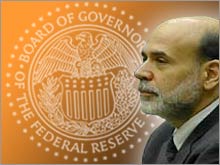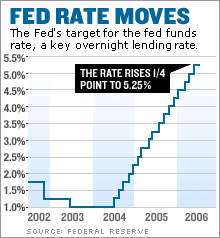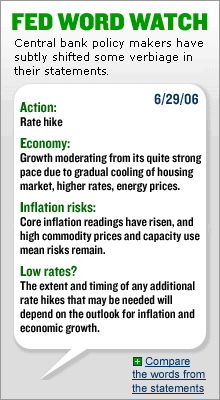Fed: To pause, or not to pause? For the first time in a while it's a cliffhanger: Will the central bank make it 18 straight rate hikes, or take a break? NEW YORK (CNNMoney.com) -- Here's a little ditty that investors should be singing as they await the results from the Federal Reserve's policy meeting Tuesday. (And apologies in advance to fans of The Clash.)
Will they raise or will they pause now? Will they raise or will they pause now? If they pause there will be trouble. But if they raise there will be double. So come on and let me know: Will they raise or will they pause? It's that kind of indecision that's bugging Wall Street. For the first time since the Fed began raising rates in June 2004, there is actual uncertainty about what will happen next. But investors' expectations that the Fed will pause grew Friday morning after the July job report showed that the economy added fewer jobs last month than economists had expected. (Full story). Traders are now betting there's a 70 percent chance the Fed will pause and just a 30 percent chance the central bank will raise its rate target another quarter percentage point at the next meeting, according to futures contracts traded in Chicago. That's up from about 60 percent before the jobs report. Another rate hike would be the 18th straight and would leave the target on the federal funds rate, an overnight bank lending rate that affects what consumers pay for various types of loans, at 5.5 percent. That would be the highest since January 2001. The Fed has been raising rates in a bid to keep inflation under control. But with the economy starting to show signs of softening, many are hoping the Fed will finally end its rate hiking campaign, even though inflation's been running above the central bank's comfort zone. Slowing economy fuels hope ... At its last meeting on June 29, the Fed said future rate hikes would "depend on the evolution of the outlook for both inflation and economic growth, as implied by incoming information," a phrase the market interpreted as meaning that the Fed may finally be ready to pause soon. Those hopes were raised further last month after Fed Chairman Ben Bernanke told members of the Senate Banking Committee that a likely slowdown in economic growth later this year should ease inflation pressures. The minutes of the Fed's June meeting, also released last month, echoed much of that sentiment. And economic growth slowed to 2.5 percent in the the second quarter, weaker than many economists were expecting, from the blistering 5.6 percent pace in the first quarter, while the housing market is showing more signs of cooling. "If you look at the numbers over the past couple of weeks, you can make a very strong case for the Fed pausing," said Vincent Boberski, a portfolio strategist with FTN Financial. Boberski said the big wild card was the July jobs report, which showed that 113,000 jobs were added to the nation's payrolls, lower than the 145,000 that economists were expecting, according to Briefing.com. A stronger-than-expected report could have been a worrisome inflation signal, which would make the Fed consider raising rates again, Boberski said. But Jim Glassman, senior economist with JP Morgan Chase, said only a super strong job number would convince the Fed to raise again next week. That clearly didn't transpire. "The job number would have to be so different from consensus that it told us all the news we've been getting about the economy slowing is wrong," he said. Glassman also said that if the Fed doesn't pause that would "baffle a lot of people" since recent statements from Bernanke and other Fed members indicate that the Fed is readying for an economic soft patch. ... but inflation is not dead yet Still, some economists think the Fed should raise rates at least one more time. Chris Probyn, chief economist with State Street Global Advisors in Boston, said the bankers need to signal to the market that inflation risks still outweigh concerns about a sluggish economy. To that end, so-called "core" consumer prices, which exclude food and energy, have increased at a higher-than-predicted rate for the past four months. "The inflation situation isn't that good and the slowing growth case isn't that bad, so there is no compelling reason to pause," Probyn said. But those arguing for a pause maintain the Fed has done all it can to combat inflation and that Bernanke & Co. would be wise to take a break instead of risking a bigger slowdown, or even a possible recession, from too many rate hikes. "I think the Fed would like to pause. We still don't know what the effects of all the tightening have been," said David Joy, chief market strategist with RiverSource Investments, a subsidiary of Ameriprise Financial. Glassman at JP Morgan noted that the bond market appears to be more worried about the economy than inflation. Yields on the 10-year U.S. Treasury note are below 5 percent, lower than the fed funds rate. If bond investors were spooked about inflation, Glassman said longer-term rates would be much higher. "The economy is slowing down and the market is edgy about this," he said. Investors in stocks are also a bit jittery. There have been several big daily moves in response to specific economic reports in recent weeks but overall, stocks have been flat since late June. Nonetheless, State Street's Probyn said the Fed does not need to worry about overshooting and sending the economy into a tailspin since short-term rates are still relatively low. "I don't think rates are that restrictive. The Fed could keep rates at 5.25 percent or 5.5 percent for a long time," he said. Probyn also said that even if the Fed pauses, the market should not take that as a sign that it will start to lower rates anytime soon. In other words, "pause" does not necessarily equal "stop." Joy agreed. He said a pause doesn't necessarily mean the Fed is getting soft on inflation. "A pause buys them more time. It may be a prelude to an eventual stop but by no means is it a done deal. They could easily tighten again depending on what the data tells them," Joy said. But FTN Financial's Boberski thinks a pause would more likely be a precursor to rate cuts, not more increases, since on average, the Fed has tended to begin lowering rates about seven to nine months after a pause. So the only thing that seems clear about what the Fed is likely to do next is that nothing is in fact clear. |
| ||||||||||||||||





